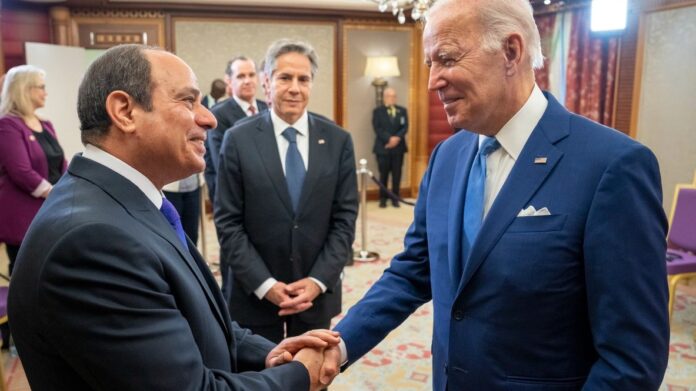September 17, 2024
The Contradiction in US Foreign Policy
The United States portrays itself as a global advocate of democracy and human rights, yet its actions often undermine this claim. The recent decision by the Biden administration to grant Egypt $1.3 billion in military aid, disregarding human rights conditions, reflects a broader pattern of prioritizing strategic interests over democratic values. This relationship with Egypt is a clear example of how the US sacrifices its proclaimed principles when it suits its geopolitical agenda.
US Support for Egypt Amidst Human Rights Violations
Egypt’s government, led by President Abdel Fattah el-Sisi, is known for its oppressive human rights record. His regime has imprisoned thousands of political opponents, stifled free speech, and maintained a system of state repression. Nonetheless, Egypt remains a critical ally for the US in the Middle East, particularly in mediating conflicts such as the ongoing war between Israel and Hamas.
Although US foreign aid to Egypt was reduced in recent years due to human rights concerns, 2024 marked a significant shift. Secretary of State Antony Blinken waived human rights conditions, releasing $225 million to Egypt, citing the nation’s role in securing a ceasefire in Gaza and its contributions to US national security. This waiver serves as another instance where human rights considerations take a backseat to strategic interests.
The US-Saudi Alliance: Overlooking Human Rights Abuses
The US has also maintained a long-standing alliance with Saudi Arabia, another authoritarian regime notorious for human rights violations. The murder of journalist Jamal Khashoggi in 2018 drew international outrage, but US support for the Saudi monarchy remained steadfast. The US continues to provide Saudi Arabia with military aid, justifying the relationship as essential for stability in the Middle East and access to global energy markets. Despite Saudi Arabia’s draconian policies and the treatment of dissidents, the alliance remains strong, showing once again how the US prioritizes its strategic needs over democratic values.
US Support for Latin American Dictatorships
Throughout the Cold War, the US also supported several brutal military dictatorships in Latin America. One of the most infamous was the regime of Augusto Pinochet in Chile. His government, responsible for the torture and execution of thousands, was supported by the US as part of its effort to counter the spread of communism. The US not only provided military aid but also economic and political backing, despite Pinochet’s atrocious human rights record.
This trend of backing oppressive regimes continued in countries like Argentina, Guatemala, and El Salvador, where the US supported governments that engaged in widespread human rights violations. These alliances were justified by the perceived need to curb communist influence, demonstrating how the US has consistently disregarded its proclaimed values in pursuit of strategic interests.
The Consequences of Supporting Authoritarian Regimes
The consequences of this approach to foreign policy have been profound and often long-lasting. By supporting dictators and authoritarian regimes, the US has contributed to regional instability and fostered deep resentment among the oppressed populations. In Egypt, for example, the support for el-Sisi’s government after the hope of the Arab Spring has fueled anger and disillusionment.
A Pattern of Hypocrisy
The pattern of US support for authoritarian leaders is clear. Whether it is Egypt, Saudi Arabia, or Cold War-era Latin America, the US has repeatedly chosen strategic interests over its stated commitment to human rights and democracy. This contradiction is a central feature of American foreign policy and one that continues to have serious consequences. By prioritizing short-term security and economic interests, the US undermines the very values it claims to promote, contributing to global instability and eroding trust in its leadership.

